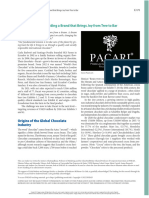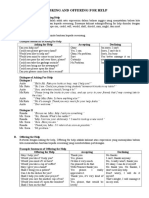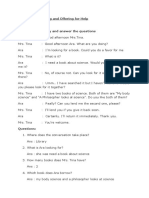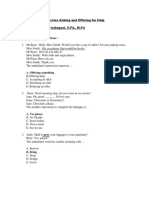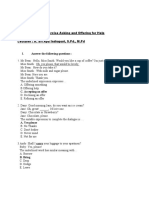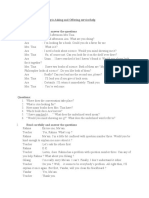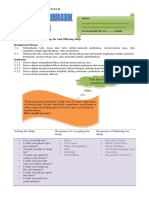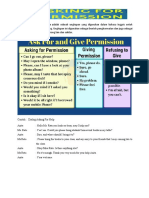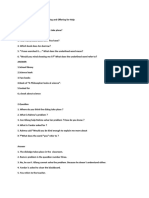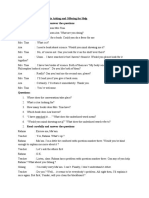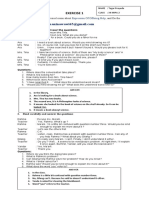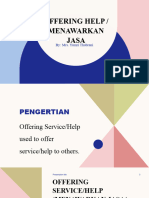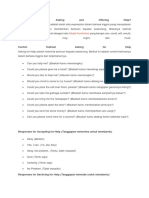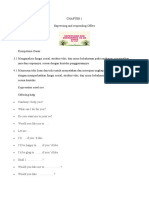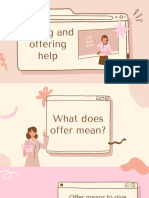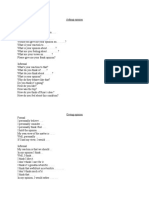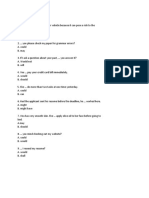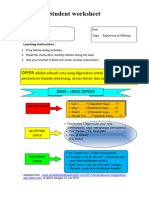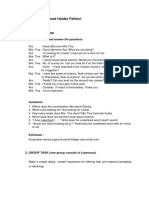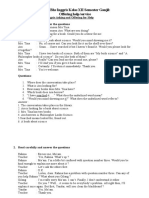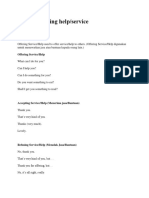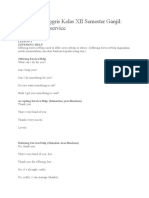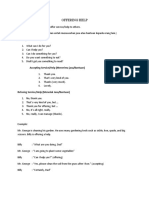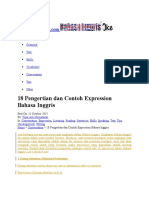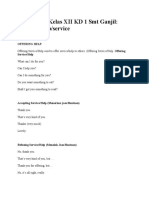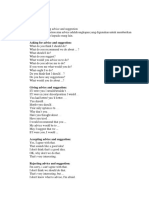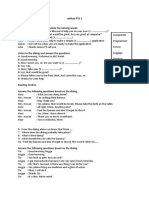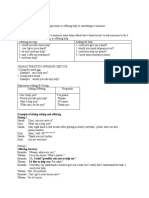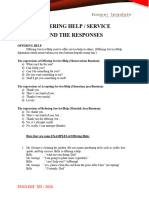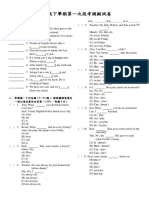Chapter I Xii
Chapter I Xii
Uploaded by
raden mas vian bhaskoroCopyright:
Available Formats
Chapter I Xii
Chapter I Xii
Uploaded by
raden mas vian bhaskoroOriginal Title
Copyright
Available Formats
Share this document
Did you find this document useful?
Is this content inappropriate?
Copyright:
Available Formats
Chapter I Xii
Chapter I Xii
Uploaded by
raden mas vian bhaskoroCopyright:
Available Formats
CHAPTER I
Expression of offering help
A. Definition
Asking and offering for help is one expression in English that states that we ask for
and provide assistance to someone. Usually the sentence asking / offering for help begins
with the words Modal Auxiliaries in the form of can, could, will, would, shall, should, may,
might, and must.
(Offering : Modal verb + subject + object)
(Asking and offering for help adalah salah satu expression dalam bahasa inggris yang
menyatakan bahwa kita meminta dan memberikan bantuan kepada seseorang. Biasanya kalimat
asking/offering for help dimulai dengan kata Modal Auxiliaries yang berupa can, could, will,
would, shall, should, may, might, dan must.)
B. The Application
1. Asking for help (Modal verb + subject + object)
a. Asking someone for help is an expression to do or ask someone for help.
The example of Asking for Help (Contoh Kalimat Asking for Help)
1. Can you help me? (Bisakah kamu menolongku)
2. Could you please give me a hand? (Bisakah kamu menolong saya?)
3. Would you like to help me? (Maukah kamu menolongku?)
4. Would you mind to come to my house? (Bisakah kamu datang ke rumahku?)
5. Could you pass the salt over there, please? (Bisakah kamu mengoper garamnya
tolong?)
6. Could you take the garbage outside? (Bisakah kamu membawa sampahnya keluar?)
7. Could you bring me the newspaper? (Bisakah kamu membawakanku koran?)
8. Could you please open the door? (Bisakah kamu membukakan pintunya?)
9. Could you lend me some money? (Bisakah kamu meminjamkan aku uang?)
10. Can you please come here for a second? (Bisakah kamu datang kesini sebentar saja?)
a. Responses for Accepting for Help (Tanggapan menerima untuk membantu)
1. Okay (Baiklah)
2. Yes, I can. (Ya, aku bisa)
3. Okay, No problem. (Tentu, tidak masalah)
4. Sure (Tentu saja)
5. Certainly (Tentu saja)
6. No Problem (Tidak masalah)
b. Responses for Declining for Help (Tanggapan menolak untuk membantu)
1. I'm sorry, I can't. (Maafkan aku, aku tidak bisa)
2. Sorry, I can't do it. (Maaf, aku tidak bisa melakukannya)
3. Sorry, I'm busy. (Maaf, aku sibuk)
4. You better manage it on your own. (Kau urus saja sendiri)
5. I'm afraid I can't do it (Aku takut aku tidak bisa melakukannya
2. Offering for help (Modal verb + subject + object)
a. Offering for help is a sentence or expression that shows that we offer help to someone
who needs help.
(Offering for help adalah kalimat atau expression yang menunjukan bahwa kita
menawarkan bantuan kepada seseorang yang membutuhkan pertolongan).
The example of Offering for Help
1. May I help you? (bolehkah aku membantumu?)
2. Would you like to help me? (bisakah kau membantuku?)
3. Could you pass the salt over there, please? (bisakah anda mengoper garam di sebelah
sana tolong?)
4. Would you like to come to my house? (bisakah kamu datang ke rumahku?)
5. Would you mind if I sit here? (apa tidak apa apa jika aku duduk disini?)
6. Open the window, please. (buka jendelanya, tolong)
7. Could you please move to another chair? (bisakah kamu pindah ke kursi lain tolong?)
8. Would you like a cup of coffee?(maukah kamu secangkir kopi?)
9. Could you please tell me where is the library? (bisakah kamu menunjukkan dimana
perpustakaan?)
10. Would you like to take the garbage outside please? (maukah kamu membawa sampah
keluar tolong?)
11. May I give you a hand? (Bisakah aku membantumu?)
12. Shall I bring you a pillow? (haruskah aku membawakanmu bantal?)
13. Can I do the dishes for you? (bisakah aku mencuci piring untukmu?)
14. Shall I help you with your project? (haruskah aku menolongmu dengan tugasmu?)
15. Would you care for another cup of tea? (maukah kamu secangkir teh lagi?)
b. Accepting Offers (Menerima Bantuan)
1. Thank you. (terimakasih)
2. Yes, please. (ya tolong)
3. I'd like it very much. (aku akan sangat menyukainya)
4. I'm pleased to do that. (aku senang melakukannya)
5. With Pleasure thank you. (dengan senang hati, terimakasih)
6. Yes please. I really appreciate it. (ya tolong, aku sangat menghargainya)
7. Thank you, it's very kind of you (terimakasih, kamu baik sekali)
8. Yes, please, that would be lovely (ya tolong, itu akan sangat menyenangkan)
c. Declining Offers (Menolak Bantuan)
1. No thanks. (tidak terimakasih)
2. I can't, thanks anyway (aku tidak bisa, terimakasih)
3. No, I really won't, thank you (tidak, aku tidak mau, terimakasih)
4. It's okay, I can do it myself. (terimakasih, aku bisa melakukannya sendiri)
5. No thank you. (tidak terimakasih)
6. No thanks, I don't need any help (tidak terimakasih, aku tidak membutuhkan bantuan)
7. Don't worry, I will do it myself. (jangan khawatir, aku akan melakukannya sendiri)
8. That's alright, I will manage it on my own. (tidak apa apa, aku akan melakukannya
sendiri)
C. The examples of dialogue
Dialog I (Asking of offering for help)
Anita : Hello Ms. Ratu you looks so busy, may I help you?
Ms. Ratu : Yes I am. Could you please bring students' homework books in my table?
Anita : Sure, and where should I bring it to?
Ms Ratu : Please bring the books to your class, and say sorry to your friends that I may
coming late to the class.
Anita : Okay Miss Ratu. Is there anything else?
Ms Ratu : No it's enough. Thank you very much for your help Anita.
Anita : Your welcome.
Terjemahan:
Anita: Hello Bu. Ratu anda terlihat sangat sibuk, bisa saya bantu?
Ibu Ratu: Ya memang. Bisa tolong bawakan buku PR siswa di meja saya?
Anita: Tentu, dan akan dikemanakan buku itu?
Ibu Ratu: Tolong bawakan buku-buku ke kelasmu, dan sampaikan permintaan maaf saya ke
teman-temanmu bahwa saya mungkin datang terlambat ke kelas.
Anita: Oke Bu Ratu. Apakah ada hal lain yang bisa saya bantu?
Ibu Ratu: Tidak ada itu cukup. Terima kasih banyak atas bantuanmu Anita.
Anita: sama sama.
Dialogue II (Asking of offering for help)
Rianda : Excuse me. Miss. May I ask you something.
Ms. Sisca : Yes, Rianda. What’s the matter ?
Rianda : May I borrow your dictionary ? I need to look up a new word.
Ms. Sisca : Sure. Here you are.
Rianda : Thank you, Miss. I’ll return it as soon as possible.
Ms. Sisca : No problem.
Terjemahan:
Rianda : Permisi, Bu. Bolehkah aku bertanya sesuatu?
Bu Sisca : Ya rianda, ada apa?
Rianda : Bolehkah aku meminjam kamus ibu? aku harus mencari arti kata baru.
Bu sisca : Tentu saja, ini dia.
Rianda : Terima kasih Bu. Aku akan mengembalikannya secepat mungkin.
Exercise I
I. Read carefully and answer the questions
Ara : Good afternoon Mrs.Tina.
Mrs. Tina : Good afternoon Ara. What are you doing?
Ara : I’m looking for a book. Could you do a favor for me
Mrs. Tina : What is it?
Ara : I need a book about science. Would you mind showing me it?
Mrs. Tina : No, of course not. Can you look for it on the shelf over there?
Ara : Umm… I have searched it but I haven’t found it. Would you please look for it
together?
Mrs. Tina : I have two books of science. Both of them are “My body science” and “A
Philosopher looks al science”. Do you like both of them?
Ara : Really? Can you lend me the second one, please?
Mrs. Tina : I’ll lend you if you give it back soon.
Ara : Certainly. I’ll return it immediately. Thank you.
Mrs. Tina : You’re welcome.
Questions:
1. Where does the conversation take place?
2. What is Ara looking for?
3. How many books does Mrs. Tina have?
4. Which book does Ara borrow?
5. “I have searched it…..” What does the underlined word mean?
6. “Would you mind showing me it?” What does the underlined word refer to?
Exercise II
II. Read carefully and answer the questions
Rahma : Excuse me, Ma’am.
Teacher : Yes, Rahma. What’s up ?
Rahma : Ma’am. I’m a little bit confused with question number three. Would you be kind
enough to explain me more about it ?
Teacher : Let’s ask the others first.
Rahma : O.K.
Teacher : Listen, class. Rahma has a problem with question number three. Can any of you
help Rahma ? What about you Gilang ?
Gilang : I’m really sorry Ma’am. I can’t. Finally, I don’t understand it either.
Teacher : Do you ? Well,…it seems to be everybody’s problem. All right then, I’ll explain it
once again. But first, Yandar, will you clean the blackboard ?
Yandar : Yes, Ma’am.
Teacher : Thank you.
Question :
1. Where do you think the dialog take place ?
2. What is Rahma’s problem ?
3. Can Gilang help Rahma solve her problem ? How do you know ?
4. What is Yandar asked for ?
5. Rahma said “Would you be kind enough to explain me more about it ?”
6. What does the word “you” refer to ?
Exercise III
You want someone to do something for you. Say it politely. Number 1 is an example.
1. Turn up the fan.
Answer : Could you turn up the fan, please?
2. Turn on the computer
Answer : …………………………………………………….
3. Turn off the television
Answer : …………………………………………………….
4. Switch off the cell phone
Answer : …………………………………………………….
5. Switch on the computer
Answer : …………………………………………………….
6. Speak loudly
Answer : …………………………………………………….
Exercise IV
1. John: Hello, Jean. Where have you been?
Jean: Hi, John. I just bought few kilograms of apples in the market.
John: Do you need some help to carry the apples?
Jean: _______
The suitable respond to complete the dialogue is ….
A. I don’t know
B. Why?
C. Of course, that’s very kind of you
D. I will help you
E. Good bye
2. Ronald: You look so busy. _______
Marry: No, thank you. I can handle them.
The suitable expression to complete the dialogue is ….
A. I will leave you alone
B. Would you like some help?
C. Do you want to help me?
D. Sure, I would like to
E. Yes, please
3. Andy: I heard there will be a concert tonight. Would you like to go with me?
Sam: I’m afraid I cannot.
Andy: Why? I think you really love the band.
Sam: Yes, I do. But I have many works at home.
Andy: Let me help you, then.
Sam: ___________
Andy: Never mind. That’s what friend should do.
What should Sam say?
A. I really appreciate your help
B. I don’t need your help
C. I am fine, thank you
D. I will go, too
E. Don’t worry
Complete the dialogue below (question 4 and 5)
Judy: Good morning, Sir. Do you have science book about animal anatomy?
Shopkeeper: Of course, dear. We have the book that you want. ______ (4) to show the shelf?
Judy: I am fine, Sir. I can find by myself. I have other books to find, too.
Shopkeeper: ________(5). Take your time.
Judy: Thank you, Sir.
4. The suitable expression to complete the dialogue is …..
A. I would like
B. Can you
C. Do not go
D. Would you like me
E. May I
5. What should the shopkeeper say?
A. I am busy
B. Sorry
C. Thank you
D. Will you go?
E. That’s okay
6. Romy : Sir, would you like me to close the window for you?
Mr. Arthur: Yes, please. It’s very cold inside.
The underlined sentence express :
A. Asking help
B. Offering help
C. Refusing something
D. Accepting an offer
E. Suggestion
7. Ela: Mom, do you need some help? You look so busy this morning.
Mom: Of course, dear.
I need another pair of hands to wash the dish.
The underlined sentence expresses ….
A. Accepting help
B. Offering help
C. Refusing help
D. Looking for something
E. Apologizing
8. Bob: Sony, will you join me to build a birdhouse?
Sony: Sure, _______. I am really excited.
Complete the dialogue above with right expression ….
A. I don’t want to.
B. I am busy today
C. I will
D. I will not
E. I have to go
9. Ronaldo: Sir, would you like me to close the window for you?
Mr. Adi: Yes, please. It’s very cold inside.
The underlined sentence express:
A. Asking help
B. Offering help
C. Refusing something
D. Accepting an offer
E. Suggestion
10. Ela: Mom, do you need some help? You look so busy this morning.
Mom: Of course, dear. I need another pair of hands to wash the dish.
The underlined sentence expresses …….
A. Accepting help
B. Offering help
C. Refusing help
D. Looking for something
E. Apologizing
11. Elsa: Will you help me to build a snowman?
Olaf: Yes, of course. ………
Complete the dialogue above ….
A. I won’t
B. I will
C. I will not
D. Will I?
E. Shall I?
12. Marta: It’s very hot here ………..
Sinta: Sure. No problem
The suitable expression to complete the dialogue is …
A. Could you close the door?
B. Would you mind if I turn on the fan?
C. Would you turn off the fan?
D. May I leave now?
E. Would you mind if I turn on the fan?
14. Mike: Oh my God, I left my book at home.
Dave: …………
The suitable expression to complete the dialogue is …
A. Shall I take it for you?
B. Just forget it.
C. Let me take you to school.
D. I’ll treat you chicken noodles.
E. Just buy it
15. May: Ah, these books are so heavy.
Eta: ……….
A. Let me help you throwing them away.
B. Let me help you sorting them.
C. Let me help you cleaning them.
D. Let me help you carrying them.
E. Let me help you opening them
This text to numbers 16-19
Anna: Hi Jane, you look so pale. Are you okay?
Jane: Hi Anna, I’m not okay. I have stomach pain. I’m looking for some medicine.
Anna: (16) …………….. to get some medicine.
Jane: (17) …………. . Thanks a lot Anna.
Anna: You’re welcome. (18) …………………..? Maybe take you to the emergency?
Jane: No thanks, (19) ……………….
16. The right answer is…
A. Let me help you
B. I don’t want you
C. I don’t think I can help you
D. Tell me how
E. Where
17. The right answer is…
A. No, I don’t need it.
B. I can do it myself.
C. Yes, please.
D. Please help me.
E. Maybe not.
18. The right answer is…
A. Would you like a cup of tea?
B. Is there anything else I can do for you?
C. No problem
D. Of course
E. Get well soon
19. The right answer is…
A. Yes, please.
B. I need it so much.
C. Definitely!
D. I want to go home
E. I can manage it myself.
20. Shopkeeper: May I help you?
A customer: No, thank you ….
The proper expression to fill the blank above is ….
A. I am just browsing
B. I’d like to buy a bouquet of flowers
C. that would be great
D. I am very happy
E. I am fine
You might also like
- Pacari ChocolateDocument13 pagesPacari Chocolatelinhnh170299No ratings yet
- Asking and Offering HelpDocument10 pagesAsking and Offering HelpAlya Alya100% (1)
- A Business Plan For Opening Take-Out Milk Tea Shop in VietnamDocument96 pagesA Business Plan For Opening Take-Out Milk Tea Shop in VietnamShǝrrʎl Apǝllido100% (1)
- Jepretan Layar 2022-08-24 Pada 08.42.39Document6 pagesJepretan Layar 2022-08-24 Pada 08.42.39MeiyaaNo ratings yet
- Asking and Offering For HelpDocument39 pagesAsking and Offering For Helpadhemulyana83% (6)
- BAB 2 Expressing OffersDocument4 pagesBAB 2 Expressing OffersMokhamad FirmansyahNo ratings yet
- Contoh Dialog Asking For HelpDocument6 pagesContoh Dialog Asking For Helpadela puspitaNo ratings yet
- Modul Bing Grade XIDocument35 pagesModul Bing Grade XImuhammadnurohim545No ratings yet
- Xii-Iis 1 - Carissa Zayyanti A.P - 08Document5 pagesXii-Iis 1 - Carissa Zayyanti A.P - 08carissa putriNo ratings yet
- Xii 3.27 Exercise Menawarkan JasaDocument7 pagesXii 3.27 Exercise Menawarkan JasaDelis JuliaNo ratings yet
- Modul Bahasa Inggris XI - Genap IsmiDocument35 pagesModul Bahasa Inggris XI - Genap Ismiggwp bangNo ratings yet
- Yurizcqa Fitri PDFDocument4 pagesYurizcqa Fitri PDFYuriska FitryNo ratings yet
- Modul Bhs Inggris Xi Wakhid SyarifudinDocument35 pagesModul Bhs Inggris Xi Wakhid SyarifudinAhmad Gifari Part IINo ratings yet
- Bahasa Inggris RenoDocument4 pagesBahasa Inggris RenoReno KurniawanNo ratings yet
- MATERI Chapter I MAY I HELP YOUDocument24 pagesMATERI Chapter I MAY I HELP YOUTomi yawan Dangu ramba100% (3)
- Lat Soal Offering Service XiiDocument3 pagesLat Soal Offering Service XiiHeny Dwi lestariNo ratings yet
- Materi Pokok: Asking For and Offering Help Kompetensi DasarDocument5 pagesMateri Pokok: Asking For and Offering Help Kompetensi Dasaraprilia ghazaliNo ratings yet
- Materi Asking For PermissionDocument3 pagesMateri Asking For Permissionyaya keceNo ratings yet
- Offering Help Kel 1 Xii Iis 1Document20 pagesOffering Help Kel 1 Xii Iis 1Snowball is RabbitNo ratings yet
- Soal Exercise Bahasa Inggris Asking and Offering For HelpDocument6 pagesSoal Exercise Bahasa Inggris Asking and Offering For HelpNaufal Arya YudistiraNo ratings yet
- Soal Exercise Bahasa Inggris Asking and Offering For HelpDocument5 pagesSoal Exercise Bahasa Inggris Asking and Offering For HelpRiza Fadiah AmirNo ratings yet
- Exercise 1: 1. Read Carefully and Answer The QuestionsDocument2 pagesExercise 1: 1. Read Carefully and Answer The QuestionsRadya PratiwiNo ratings yet
- Offering Help PresentationDocument14 pagesOffering Help Presentationyawnzznn234No ratings yet
- Apa Itu Asking and Offering HelpDocument13 pagesApa Itu Asking and Offering Helpaep sopandi100% (3)
- Offering HelpDocument8 pagesOffering HelpUcing GalakNo ratings yet
- Asking and Offering Help XiDocument10 pagesAsking and Offering Help XiAnisa FiantiNo ratings yet
- Giving Suggestion 1: Lost Money One Day Jesicca Lost Her Money in Her Bag, She Look So Sad and Barbara ComeDocument8 pagesGiving Suggestion 1: Lost Money One Day Jesicca Lost Her Money in Her Bag, She Look So Sad and Barbara ComenitaNo ratings yet
- Materi Asking and Giving For OpinionDocument10 pagesMateri Asking and Giving For OpinionRyan wahyuNo ratings yet
- Rangkuman Soal Kelas 8 Sem 1Document7 pagesRangkuman Soal Kelas 8 Sem 1Raditya IndraNo ratings yet
- LKPD Offering - Sman 3 P.rayaDocument6 pagesLKPD Offering - Sman 3 P.rayaSITI SHOLEHANo ratings yet
- Kelas XIIDocument33 pagesKelas XIIHideyoshi Fira100% (1)
- Contoh Percakapan Bahasa Inggris Menawarkan PertolonganDocument20 pagesContoh Percakapan Bahasa Inggris Menawarkan PertolonganJon Neker100% (1)
- Us B.ing KLS Xii LM 2023Document17 pagesUs B.ing KLS Xii LM 2023luyenk73No ratings yet
- Bahasa InggrisDocument5 pagesBahasa Inggrishafizhalauddin692No ratings yet
- To Offer Help and Favor: An Important Part of Everyday LifeDocument9 pagesTo Offer Help and Favor: An Important Part of Everyday LifeRatih Ayunani IrawanNo ratings yet
- Kelas Xii - May I Help You - Chapter 1Document2 pagesKelas Xii - May I Help You - Chapter 1Syifa Fauziah50% (2)
- Offering HelpDocument16 pagesOffering HelpiambepeunNo ratings yet
- SOAL LATIHAN Asking and Giving Permission KLS VIIIDocument3 pagesSOAL LATIHAN Asking and Giving Permission KLS VIIISiti najlah azisNo ratings yet
- Materi Asking and Offering For HelpDocument9 pagesMateri Asking and Offering For HelpFranky ArdanaNo ratings yet
- Materi Bhs Inggris Kelas XI Semester Ganjil DARINGDocument34 pagesMateri Bhs Inggris Kelas XI Semester Ganjil DARINGMelita UtariNo ratings yet
- Handout Asking Offering HelpDocument10 pagesHandout Asking Offering HelpSushi Ikan32No ratings yet
- Asking and Offering HelpDocument9 pagesAsking and Offering Helpananda salsabilaNo ratings yet
- Bahasa InggrisDocument23 pagesBahasa InggrisLynda Asita Shara100% (1)
- Xii Offering HelpDocument17 pagesXii Offering HelpNonon Saribanon100% (1)
- Materi BIG Kelas XII KD 1 SMT GanjilDocument15 pagesMateri BIG Kelas XII KD 1 SMT Ganjilcarissa putriNo ratings yet
- c1 Offering Help Rev 2018Document18 pagesc1 Offering Help Rev 2018Rezkyki Awaluddin100% (1)
- Modul B.inggrisDocument36 pagesModul B.inggrisSalFarras Rafliandra AqilNo ratings yet
- Latihan PTS 1 Listening Section Listen To The Dialog and Complete The Missing WordsDocument3 pagesLatihan PTS 1 Listening Section Listen To The Dialog and Complete The Missing WordsMuhammad RifaldiNo ratings yet
- Offering ServiceDocument4 pagesOffering ServiceModding GurujiNo ratings yet
- Material of OFFERING HELPDocument7 pagesMaterial of OFFERING HELPRagil Anugrah rafinandaNo ratings yet
- Chapter 1Document7 pagesChapter 1suci 11No ratings yet
- Materi Bhs Inggris Kelas XIIDocument10 pagesMateri Bhs Inggris Kelas XIIAdis60No ratings yet
- Suggestion & OfferingDocument5 pagesSuggestion & OfferingAngel DwinataNo ratings yet
- Modul 1 Offering N SuggestionDocument3 pagesModul 1 Offering N SuggestionWho Am I?No ratings yet
- Asking Someone To Do SomethingDocument4 pagesAsking Someone To Do SomethingKartika Dwi AnandaNo ratings yet
- MAKALAHDocument13 pagesMAKALAHX IPS 4Ni Made Winda Maharani28No ratings yet
- Offering-Help-Conversation/: Buka Link Ini Untuk Latihan Dialogue 1,2Document6 pagesOffering-Help-Conversation/: Buka Link Ini Untuk Latihan Dialogue 1,2Rizka dwiNo ratings yet
- 12-English - Offering Help ServiceDocument13 pages12-English - Offering Help ServiceSad BoysNo ratings yet
- Expressing OfferingDocument7 pagesExpressing OfferingZK ZKNo ratings yet
- 2-in-1 Book Series: Teacher King’s English Beginner Course Book 1 & English Speaking Course Book 1 - Thai EditionFrom Everand2-in-1 Book Series: Teacher King’s English Beginner Course Book 1 & English Speaking Course Book 1 - Thai EditionNo ratings yet
- 2-in-1 Book Series: Teacher King’s English Beginner Course Book 1 & English Speaking Course Book 1 - Chinese EditionFrom Everand2-in-1 Book Series: Teacher King’s English Beginner Course Book 1 & English Speaking Course Book 1 - Chinese EditionNo ratings yet
- Rekap Produk SMK 2020-2021Document7 pagesRekap Produk SMK 2020-2021raden mas vian bhaskoroNo ratings yet
- 102 294 1 PB PDFDocument20 pages102 294 1 PB PDFraden mas vian bhaskoroNo ratings yet
- A. Choose The Right Answer A, B, C, or D!: We Know From The Conversation That Ayu's Bedroom IsDocument2 pagesA. Choose The Right Answer A, B, C, or D!: We Know From The Conversation That Ayu's Bedroom Israden mas vian bhaskoroNo ratings yet
- Hasil UH 1 SMA Kls X.C PuteraDocument1 pageHasil UH 1 SMA Kls X.C Puteraraden mas vian bhaskoroNo ratings yet
- No No Induk Nama Peserta Didik L/P ScoreDocument1 pageNo No Induk Nama Peserta Didik L/P Scoreraden mas vian bhaskoroNo ratings yet
- Materi Quiz Bahasa InggrisDocument3 pagesMateri Quiz Bahasa Inggrisraden mas vian bhaskoroNo ratings yet
- Franchise PackagesDocument25 pagesFranchise PackagesAngela Parado100% (1)
- 00-110國中英語1下段考即時通 學用 (110f811886)Document12 pages00-110國中英語1下段考即時通 學用 (110f811886)邵昱寧No ratings yet
- Cookie RecipeDocument3 pagesCookie Recipeeleazar.leannagail100% (1)
- Assignment 1 BBADocument2 pagesAssignment 1 BBANosheen RamzanNo ratings yet
- Learning Module in Bread in Pastry ProductionDocument8 pagesLearning Module in Bread in Pastry ProductionYoshi YosinkeiNo ratings yet
- 2020 - Trial - English - SPM - Kertas 2 - MaranDocument19 pages2020 - Trial - English - SPM - Kertas 2 - MaranJee RazaliNo ratings yet
- BSBWRT501 11Document12 pagesBSBWRT501 11xintanNo ratings yet
- Starbucks Coffee: A Case StudyDocument41 pagesStarbucks Coffee: A Case Studygaurav100% (1)
- Tea As A Best GIftDocument1 pageTea As A Best GIftvidhyalathaNo ratings yet
- Đề 2Document4 pagesĐề 2Phương ĐặngNo ratings yet
- 02 Revman Exercise Caffeine Articles JournalsDocument8 pages02 Revman Exercise Caffeine Articles JournalsKenneth TorresNo ratings yet
- The National Symbols of EnglandDocument4 pagesThe National Symbols of EnglandBuhociu RamonaNo ratings yet
- Presentation: Zero and First Conditionals Time LinkersDocument2 pagesPresentation: Zero and First Conditionals Time LinkersTania Delgado ChoqqueNo ratings yet
- Goodnight Princess: Sleepless in Fairytale LandDocument13 pagesGoodnight Princess: Sleepless in Fairytale LandNyra BanerjeeNo ratings yet
- The Daily Drip FinalDocument31 pagesThe Daily Drip FinalJocelyn Mae CabreraNo ratings yet
- Unit 1 Listening Test: Project 2 Skills TestsDocument6 pagesUnit 1 Listening Test: Project 2 Skills TestsMyAcademy AceNo ratings yet
- نماذج القرامر نسخة غير محلولةDocument220 pagesنماذج القرامر نسخة غير محلولةshahadz654321No ratings yet
- Baileys Oreo Mousse Cups The Scran Line - TastemadeDocument2 pagesBaileys Oreo Mousse Cups The Scran Line - TastemadeMiguel RamosNo ratings yet
- Anti Sensitive & Eczema LotionDocument4 pagesAnti Sensitive & Eczema Lotionnorpadilah abd latifNo ratings yet
- HERSHEY'S PERFECTLY CHOCOLATE Chocolate CakeDocument3 pagesHERSHEY'S PERFECTLY CHOCOLATE Chocolate CakeKevin ZivicNo ratings yet
- GhostsDocument4 pagesGhostsapi-636571933No ratings yet
- Pua 287Document11 pagesPua 287Nor Idayu IsmailNo ratings yet
- Jurnal Sefira UhyaDocument7 pagesJurnal Sefira UhyaSefira UhyaNo ratings yet
- KEY KHOI 6 - Giaoandethitienganh - InfoDocument259 pagesKEY KHOI 6 - Giaoandethitienganh - InfoThắm GiảnNo ratings yet
- Arabica Coffee Varieties PDFDocument72 pagesArabica Coffee Varieties PDFtheblueserenadeNo ratings yet
- Servan, Edmark Ang: Employment HistoryDocument3 pagesServan, Edmark Ang: Employment HistoryRhaine Karol A. ServanNo ratings yet
- InstaPDF - in Tata Products List 821Document4 pagesInstaPDF - in Tata Products List 821Imran Mushtaq100% (1)
- Soft Cream Black Simple Minimalist Travel Plan Korea PresentationDocument11 pagesSoft Cream Black Simple Minimalist Travel Plan Korea Presentationapi-636356644No ratings yet
